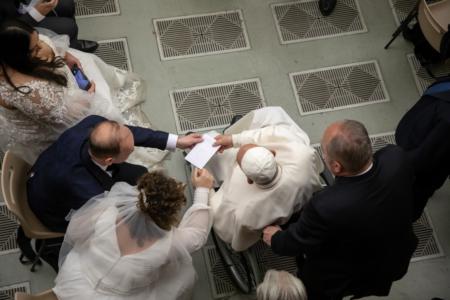Archbishop holds first meeting with VOTF
On Nov. 19, Archbishop Seán P. O’Malley met for the first time with leaders of the lay organization Voice of the Faithful (VOTF).
Archdiocesan spokesperson Father Christopher Coyne and VOTF president James E. Post described the first meeting as conversational. Both sides said they were hopeful about the direction the archdiocese has taken since the scandal and were optimistic about working together more closely in the future.
"Because there are so many positive things that have taken place, while recognizing we still have many things to do ... allows for a conversation that is open and honest," Father Coyne told the media after the meeting.
Father Coyne characterized the tone of the hour-long meeting as “very respectful” and said that “the discussion got very lively, but in a good way, not in an antagonistic or confrontational way.”
Archbishop O’Malley used the occasion of the meeting as a chance to learn more about VOTF, an international organization claiming over 30,000 members. VOTF, now based in Newton, first formed in Wellesley in response to the clergy sexual abuse crisis.
Other archdiocesan representatives attending the meeting were Bishop Richard G. Lennon, moderator of the curia, David W. Smith, chancellor, and Barbara Thorp, director of the Office of Pastoral Support and Outreach.
Post was accompanied at the meeting by VOTF executive director Steve Krueger, and two VOTF members, Elia Marnik of St. Agnes Parish, Reading, and Margaret Roylance of Our Lady Help of Christians Parish, Newton.
Among the main issues discussed were the Voice of Compassion Fund, an alternative for Catholics not wishing to donate money to the archdiocesan appeal, and the partial ban on VOTF affiliates meeting on church property. Both the fund and the ban have caused tension within the archdiocese.
In the past, Cardinal Bernard Law and Bishop Lennon, then apostolic administrator, both refused to accept money from the fund because of restrictions the group placed on how it could be used. Catholic Charities accepted the money.
"We have in place right now a structure that is very open and transparent as to how the money that is raised is used that anyone can see," Father Coyne said of the Annual Catholic Appeal.
According to Father Coyne, the archbishop has not decided whether he will accept money from the fund, but has asked Chancellor Smith to take the preliminary step of examining “how best to allow the archdiocese to receive Voice of Compassion funds,” within the archdiocesan financial structure.
Father Coyne also stated that the archbishop “would consider lifting the partial ban” on VOTF affiliates that Cardinal Law enacted last year and Bishop Lennon retained during his tenure as apostolic administrator. However, the archbishop declined to establish a time frame on taking action in this matter saying that he “did not want to set up an unrealistic goal,” according to Father Coyne.
No date has been set for another meeting with the group.
In his remarks to the media, Post described the archbishop as “friendly, warm and very engaging.”
"We spoke and he listened and he spoke and we listened," said Post. "There was a great deal of mutual respect around the table. We clearly had a lot to learn from one another."
Post said that during the meeting he asked the archbishop to make public an audit of the archdiocese’s compliance with the United States Conference of Catholic Bishops guidelines on child protection. According to Post, Archbishop O’Malley promised to release the audit to the public by January 2004.
"That [release] would form the foundation in which survivors, the laity and representatives from archdiocese would be able to go forward in terms of planning to deal with the residue of this terrible crisis," Post said.
Regarding the Voice of Compassion Fund, Post speculated that after consideration the archdiocese would accept the money. There is currently under $10,000 in the fund, he said.
Post described the discussion on the archdiocese’s ban on VOTF using church property as “the most strained part of the conversation.” Archbishop O’Malley agreed to “look into this issue carefully,” said Post. “I think we walked out of there with a sense that this [issue] is not going to be dragging out endlessly.”
The role of the laity in the archdiocese was also discussed. According to Post, both he and the archbishop agreed on the importance of “efforts to revitalize parish councils and finance councils at parish and diocesan levels.”
Post was optimistic about the group’s future saying, “I think we walked out with an understanding that there are more meetings to come and that most importantly VOTF and the Archdiocese of Boston will have continuing conversations as part of the normal business of being Catholic in the Archdiocese of Boston in 2004.”

















